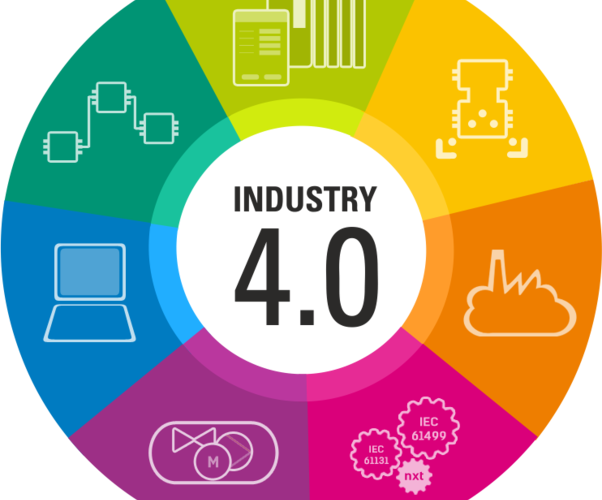Every industry – manufacturing, transport, agriculture, education – is being disrupted and transformed beyond recognition by Industry 4.0.
“Industry 4.0, through automation, integration systems, data collection and data analysis, can help to inform industry and government on how decisions can be made about competitiveness, about manufacturing, and about the re-skilling of people in low-skill jobs,” says Conrad Kassier, Industrial Energy Efficient Consultant at United Nations Industrial Development Organisation (UNIDO).
The acceleration of information and communication technology (ICT) has blurred the line between virtual reality and the real world.
Industry 4.0 is about networking the Internet of Things (IoT), where machines communicate with each other, and the Internet of People (IoP), where machines communicate with people. The result: industries integrate the real and virtual worlds.
Machines collect and analyse data for faster, better decision-making. Robots take over production lines. Refrigerators become hackable. Self-driving vehicles venture onto the roads …
“There are many opportunities in various sectors where Industry 4.0 in a broad sense can assist the industry to be more competitive, where they can access new markets and where new industrial development opportunities are very evident,” continues Kassier.
The most important opportunity emerging from all this confusion is the possibility of leveraging Industry 4.0 for a smart, green world that is resilient to climate change. Logically, then, Industry 4.0 has emerged as a vital, cross-cutting theme at Sustainability Week 2018.
“Industry 4.0 is a must in the context of smart and sustainable cities”, asserts Executive Mayor of Tshwane, Councillor Solly Msimanga. “We are making steady in-roads in the City with our free wifi programme, our smart control centre for our Bus Rapid Transit system, A Re Yeng, and our e-Tshwane app – these are all building blocks towards Tshwane being a smart city and therefore an efficiently managed city”.
Whilst Industry 4.0 makes sense in running a city more efficiently, it has far wider application. Try agriculture. You might think farming is as far from “the Cyber” as you can get.
Actually, the combination of drone and satellite technology and data analysis is already making agriculture more productive and climate-resilient – and the transformation has only just begun. It’s also bringing young people into an industry that used to be considered ‘boring’.
“Solving one of the world’s largest problems, agriculture, with cutting-edge and innovative solutions is a driving force behind young people seeing a bright future in AgriTech,” says Timothy Willis, CFO of Aerobotics and set to speak at Sustainability Week’s Agriculture and Food Security Seminar.
“We’re using some of the world’s most advanced data science algorithms to solve this problem and that is extremely exciting.”
It doesn’t stop at agriculture. Industry 4.0 has infiltrated the Water Seminar, the Energy Seminar, the Transport and Mobility Seminar, and the Vision Zero Waste Seminar, not to mention the Green Building and Infrastructure Conference. Smart metering, smart grids, smart cars, smart buildings, and smart means of converting waste flows to revenue streams – that’s the all-encompassing smart built environment being ushered in by Industry 4.0.
It’s time to bring yourself up to speed!
Then, the Industry 4.0 Workshop delves into the new and exciting opportunities that the digital transformation of industry and exponential technology changes offer South African manufacturing especially.
At the same time, the Workshop emphasizes the continuous education, re-skilling and up-skilling necessary to ensure people don’t lose jobs to robots. Pepper, the humanoid robot, will address the audience with a special message.
Last but far from least, the Youth and the Green Economy Dialogue invites young students and job-seekers to engage with the Fourth Industrial Revolution.
To ride the wave of change and not get left behind, young people will need to combine creativity, problem-solving, engineering, life skills, and a dynamic perspective of perpetual adaptation, self-investment and improvement. The time to start is now.
“The risks associated with industry 4.0 is that the industry is not able to keep up with the up-skilling of their workers,” says Kassier. He believes it important for government and industry to come up with a model that is both conducive for skills development and industry.
In support of the Industry 4.0 theme, Sustainability Week 2018 features a line-up of world-class experts from the UNIDO, the Council for Scientific and Industrial Research (CSIR), the Development Bank of South Africa, the Water Research Council, the Southern African Association for Energy Efficiency, the Green Building Council of South Africa, Aurecon, GIBB, Sqwidnet, and many more.
Sustainability Week 2018 runs from 5 to 7 June at the CSIR International Conference Centre in the host city of Tshwane, South Africa’s leading green building metro.
Business a.m.’s comment pages are a place for thought-provoking views and debate. These views are not necessarily shared by Business a.m.









